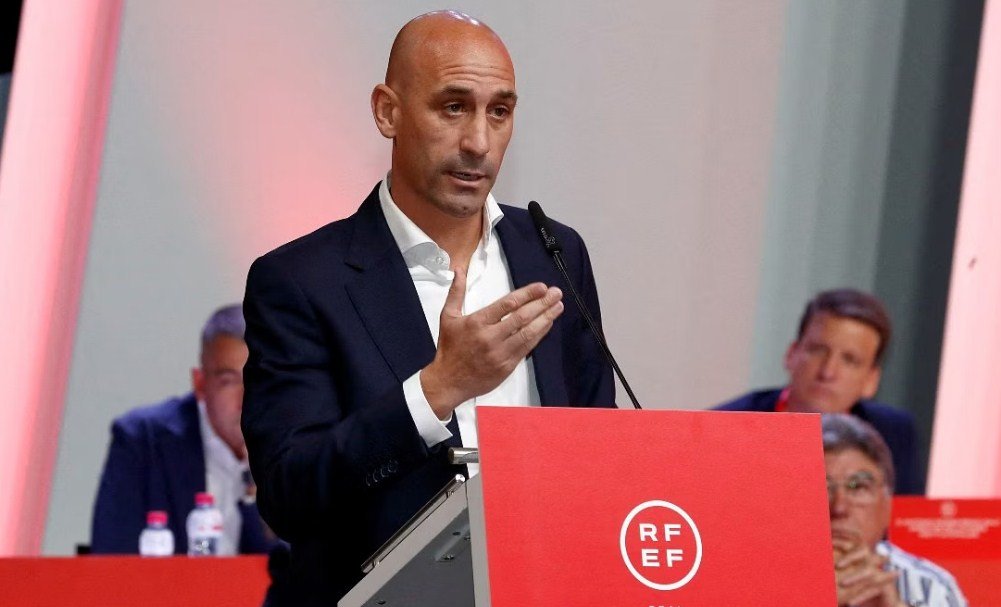Luis Rubiales, the president of the Royal Spanish Football Federation (RFEF), has announced his resignation on Sunday night, following weeks of controversy over his inappropriate kiss with Spain forward Jennifer Hermoso during the Women’s World Cup celebrations.
A kiss that sparked outrage
Rubiales was caught on camera kissing Hermoso on the lips, without her consent, as she lifted the World Cup trophy in front of thousands of fans at the Santiago Bernabéu Stadium on August 6. The incident was widely condemned as a sign of disrespect and harassment towards the player and the women’s team.
Hermoso, who scored six goals in the tournament and was named the Golden Boot winner, said she felt “humiliated” and “violated” by Rubiales’ action. She filed a formal complaint against him and demanded a public apology. Several of her teammates and other prominent figures in Spanish football also expressed their support for Hermoso and their outrage at Rubiales.
Rubiales initially denied any wrongdoing and claimed that he was just trying to congratulate Hermoso in a friendly way. He said he had a good relationship with her and the rest of the team and that he was proud of their historic achievement. He also accused some media outlets and rival factions of trying to undermine his position and tarnish his reputation.
A fighter who lost his battle
Rubiales, a former player and union leader, was elected as the RFEF president in May 2018, after defeating the incumbent Ángel María Villar, who was arrested on corruption charges. Rubiales promised to reform and modernize the federation and to defend the interests of Spanish football at all levels.
He was involved in several disputes with La Liga’s president Javier Tebas, over issues such as the scheduling of matches, the use of VAR, and the staging of games abroad. He also clashed with some clubs and managers over his decisions regarding the national team, such as sacking Julen Lopetegui on the eve of the 2018 World Cup and appointing Luis Enrique as his successor.
Rubiales faced several legal challenges and investigations against him, including allegations of tax fraud, misuse of funds, and breach of contract. He also had to deal with leaks of private messages and recordings that exposed his opinions and conflicts with various stakeholders in Spanish football.
Despite all these difficulties, Rubiales maintained a defiant attitude and refused to resign. He said he was a fighter who had overcome many obstacles in his life and career. He claimed that he had the support of most of the RFEF members and that he had done a good job as president. He also said that he was not afraid of any legal or judicial consequences.
However, his position became untenable after the kiss scandal, which provoked a massive backlash from the public, the media, and the political sphere. He faced calls for his resignation from various sectors, including some of his allies and supporters. He also lost the confidence of UEFA, where he served as vice president.
A resignation that leaves questions
On Sunday night, Rubiales announced his resignation through a letter addressed to Pedro Rocha, the interim president of the RFEF. He said that he had also resigned from his role as vice president of UEFA. He said that he had no choice but to step down, as he felt that his presence was harming the federation and Spanish football. He also said that he did not want to wait for any judicial resolution or appeal process, as that would not contribute anything positive.
He thanked all those who had supported him during his tenure and expressed his love for Spanish football. He also apologized to Hermoso and the women’s team for any harm or discomfort he had caused them. He said that he had always respected them and admired their work. He also asked for forgiveness from his family and friends for any mistakes he had made.
He did not mention any plans for his future or any potential successor for his position. He said that he hoped that Spanish football would continue to grow and prosper under new leadership.
His resignation was welcomed by many people who saw it as a victory for feminism and justice. However, it also raised questions about the state and direction of Spanish football, which is facing several challenges and uncertainties in terms of governance, finances, competitiveness, and identity.

